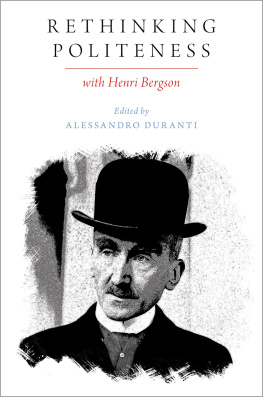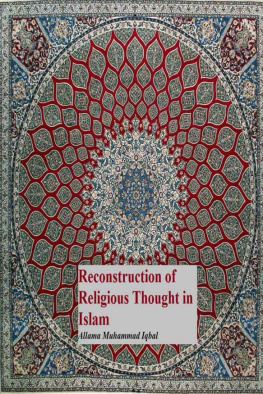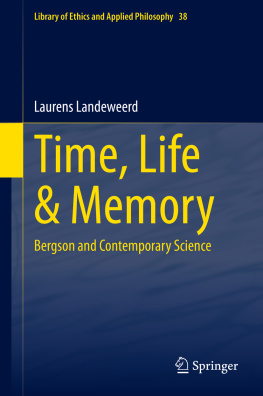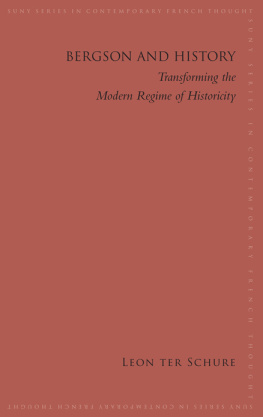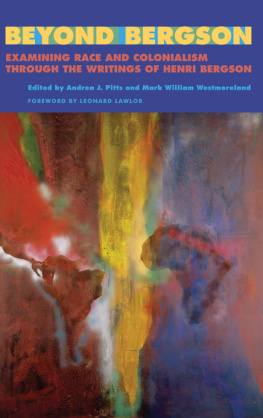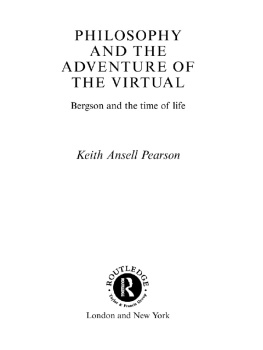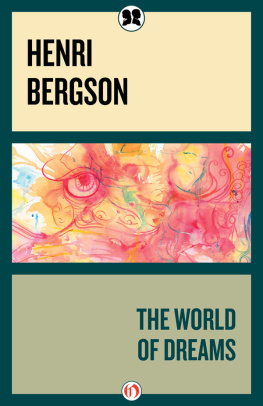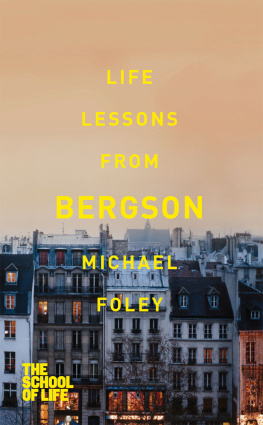POSTCOLONIAL BERGSON

Fordham University Press gratefully acknowledges financial assistance and support provided for the publication of this book by Columbia University.
Copyright 2019 Fordham University Press
All rights reserved. No part of this publication may be reproduced, stored in a retrieval system, or transmitted in any form or by any meanselectronic, mechanical, photocopy, recording, or any otherexcept for brief quotations in printed reviews, without the prior permission of the publisher.
This book was first published in French as Bergson postcolonial: Llan vital dans la pense de Lopold Sdar Senghor et de Mohamed Iqbal , by Souleymane Bachir Diagne 2011 CNRS ditions, Paris.
Cet ouvrage a bnfici du soutien des Programmes daide la publication de lInstitut Franais.
This work, published as part of a program of aid for publication, received support from the Institut Franais.
Fordham University Press has no responsibility for the persistence or accuracy of URLs for external or third-party internet websites referred to in this publication and does not guarantee that any content on such websites is, or will remain, accurate or appropriate.
Fordham University Press also publishes its books in a variety of electronic formats. Some content that appears in print may not be available in electronic books.
Visit us online at www.fordhampress.com.
Library of Congress Cataloging-in-Publication Data
Names: Diagne, Souleymane Bachir, author. | Turner, Lindsay, translator.
Title: Postcolonial Bergson / Souleymane Bachir Diagne ; translated by Lindsay Turner.
Other titles: Bergson postcolonial. English
Description: New York : Fordham University Press, 2020. | Includes bibliographical references and index. | Summary: At a moment of renewed interest in Bergsons philosophy, this book, by a major figure in both French and African philosophy, gives an expanded idea of the political ramifications of Bergsons thought in a postcolonial contextProvided by publisher.
Identifiers: LCCN 2019028522 | ISBN 9780823285839 (hardback) | ISBN 9780823285822 (paperback) | ISBN 9780823285846 (epub)
Subjects: LCSH: Iqbal, Muhammad, Sir, 18771938Philosophy. | Senghor, Lopold Sdar, 19062001Philosophy. | Bergson, Henri, 18591941Influence. | Decolonization. | Postcolonialism.
Classification: LCC B2430.B43 D52413 2020 | DDC 194dc23
LC record available at https://lccn.loc.gov/2019028522
Printed in the United States of America
21 20 195 4 3 2 1
First edition
CONTENTS
John E. Drabinski
JOHN E. DRABINSKI
Henri Bergson teaches us how to read philosophers: we must begin by taking a step back from their thought in order to return to its sources, weigh the influences that nurtured it and pinpoint the ideas of which the doctrine is a synthesis. But the real fruit of this effort, Bergson indicates, is reaped at the point where we discover the initial intuition of which the doctrine is an unfolding.
SOULEYMANE BACHIR DIAGNE, AFRICAN ART AS PHILOSOPHY
Who is Bergson to the postcolonial moment?
This is no small question. In it, we find some of the most perplexing enigmas of thinking the postcolonial. What is a text? What is a text in relation to the author? What is the text in relation to the historical moment? And the author to the historical moment, folded back into the relation to the text? These are all questions that inhere in any critical reading practice, to be sure, especially now that we are a number of decades past the emergence of historicism as a form of inquiry and interpretation. A text does not float outside of time and therefore carries with it so many elements of history and memory. History and memory bear on a text in ways that sustain, enable, and extend the meaning of arguments and descriptions. This is what it means to encounter a text inside a tradition. When we encounter a text inside a tradition, presuming the notion of tradition to be stable and productive (no small assumption), intertextuality is everything; references internal and external to the particular text bring a writerly endeavor to life and we who interpret for a living, professional Hermes figures, draw deeply on such references as referrals and deferrals both.
But the postcolonial moment is something very different. The postcolonial text is always fraught and tense. Conflicted over its own temporality. Puzzling over the fecundity of the past and also the pitfalls of the backward glance at every turn. Critical eyes more appropriately fixed on what the future might mean when it comes. Temporality is conflicted because the text emerges in time, carrying with it all the stains and limits of the past, shrouded sometimes in the awfulness of historical atrocity, animated in other cases by the parochialism or small world vision of its author and the authors epoch. At the same time, in the same time, the texts bears a productive past. Sometimes in traces and fragments, in other times as a suppressed vital force waiting on the margins for space within which to operate, and always, in the postcolonial moment, as a kind of volcanic force. From beneath the surface, an antithesis to the colonial model and its domination. Between these two times, the time of domination and the time of a past difference now become resistance, the future emerges as a project for thinking.
Bergsons work is such an interesting site for reflection. The vitalist movement, of which he was such an important member, faded quickly from center stage in France and Europe following the First World War, overtaken in the years leading up to and then after the Second World War by existentialism and phenomenology. But Bergson remained the influential figure of that moment, registering a deep mark on the work of Jean-Paul Sartre, Maurice Merleau-Ponty, Gilles Deleuze, Emmanuel Lvinas, and many others. That legacy tells a fairly straightforward story. Influenced by his insistence on time, temporality, and the moment, then infused with emerging phenomenological and existential methodologies coming out of Germany, French philosophy transformed Bergsonian thinking while also giving structural rigor and depth to his most foundational claims.
In the postcolony? This is a more complicated story. Donna Joness excellent critical genealogy of vitalist thought in the Negritude movement, the 2010 book The Racial Discourses of Life Philosophy , draws out this complicated relation of influence and transformation, identifying in clear terms how Bergsons thought, through both his own articulations and its uses and abuses by colonial thinkers, operated as a legitimizing infrastructure of racial prejudice and colonial domination at the level of politics, culture, and intellectual production. At the same time, however, Bergsons work spread its influence in the colonies, taking up important roles in the works of some of the most important anticolonial thinkers of the era. In particular, Lopold Senghor, to whom so many of the pages in Postcolonial Bergson are dedicated. Indeed, Senghors conception of Negritude is nearly inseparable from an engagement with Bergsons thought, at the level of both tone and frame and the methods by which one rigorously interrogates the Africanness at the heart of Senghors thinking. A half-caste thought, as he puts it, but also a robust, unmediated Africanness rooted in long-standing traditions of speech, gesture, art, and dance. Bergsons work gets Senghor inside Africanness. We can see immediately how this postcolonial thought is fraught. What does it mean to take a white Western thinker to bear on African thinking? This is an anxious sort of moment for many folks working in postcolonial theory and cultural politics. For Senghor, however, it was always a productive relation. As it was for Muhammad Iqbal, a thinker of reconstruction after the colony. And so many others across the anglo- and francophone worlds of the Global South.
Next page

